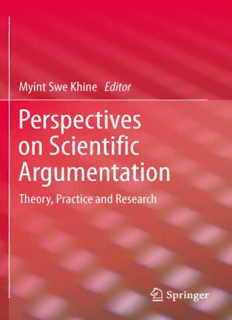
Perspectives on Scientific Argumentation: Theory, Practice and Research PDF
Preview Perspectives on Scientific Argumentation: Theory, Practice and Research
Perspectives on Scientific Argumentation Myint Swe Khine Editor Perspectives on Scientific Argumentation Theory, Practice and Research Foreword by Deanna Kuhn 123 Editor MyintSweKhine BahrainTeachersCollege UniversityofBahrain Manama KingdomofBahrain [email protected] [email protected] ISBN978-94-007-2469-3 e-ISBN978-94-007-2470-9 DOI10.1007/978-94-007-2470-9 SpringerDordrechtHeidelbergLondonNewYork LibraryofCongressControlNumber:2011939071 ©SpringerScience+BusinessMediaB.V.2012 Nopartofthisworkmaybereproduced,storedinaretrievalsystem,ortransmittedinanyformorby anymeans,electronic,mechanical,photocopying,microfilming,recordingorotherwise,withoutwritten permissionfromthePublisher,withtheexceptionofanymaterialsuppliedspecificallyforthepurpose ofbeingenteredandexecutedonacomputersystem,forexclusiveusebythepurchaserofthework. Printedonacid-freepaper SpringerispartofSpringerScience+BusinessMedia(www.springer.com) Foreword This volume, together with a similar recent collection edited by Erduran and Jiménez-Aleixandre(2007),marktheconcentrationofattentionnowbeingdevoted toargumentationasaprocesscentraltoscienceandtoscienceeducation.Theidea ofscienceasargument(Kuhn,1993,2010)isakeyoneinthatitencompassesboth theepistemologicalandtheproceduralaspectsofdoing,teaching,andlearningsci- ence.Accordingly,ithassignificantimplicationsforjustaboutalloftheconcerns ofscienceeducators(Duschl,2008). Theepistemologicalimplicationsarethemostchallengingforscienceeducators. Itisonethingforustorecognizeargumentasthecoreofscientificpracticeandquite anothertogetyoungstudents,andevenolderones,toconceptualizescienceinthis way.InChapter2,Nussbaum,Sinatra,andOwensdiscusstheneedtoconfrontstu- dents’misconceptions,andperhapsthemostpervasiveandenduringoftheseisthe misconception of science as an accumulation of facts. If students are to come to believe otherwise, it is essential that educators model scientific practice as some- thing else than this – namely, as a successive revision of theories as new evidence is brought to bear on them. In the absence of such modeling, how can we expect studentstoreplacetheirnaïveepistemologiesofsciencewithmorerobustones? Argumentation is of course the heart of scientific practice. With the right kind of modeling, engagement, and practice, students can come to experience this sci- entificprocessforthemselves.Insodoingtheystandtotransformtheirconception of the product of science from one of facts to one of arguments and the scientific processtooneofcoordinatingtheoriesandevidence.AsCavagnettoandHandput itintheirchapter(Chapter3),theycometorecognizethedistinctionbetweendata and evidence. There is as yet little rigorous evidence that engagement in science as argument is sufficient to engender change with respect to this epistemological transformation, but a recent intervention study by Iordanou (2010) contains some promisingfindingsthatsuggestitcanbe. OsborneandSzu,BerlandandHammer,andseveralotheroftheauthorsinthis volume recognize and lament the fact that argumentation of any form is seldom present in science classrooms. It is not clear what the most effective path will be toward changing this state of affairs, but one thing that is clear is that the efforts ofpractitionersandpolicymakersneedtobesupportedbyanexpandedknowledge v vi Foreword baseregardingthenatureofargumentiveskillsandtheirdevelopment.Assessment and analysis are needed at the level of the classroom, as Sampson, Enderle, and WalkerhaveundertakenanddescribedinChapter12,atthelevelofdialogicargu- mentation,theapproachIhavetakeninmyownresearch(Kuhn,2010),andatthe levelofindividualargument,whichOsborneandSzuaddress.Ateachoftheselev- els, although considerable progress has been made, we do not yet know enough aboutthenatureofthecompetenciesinvolved. A recurring and key question is whether these competencies are specific to the domain of science or broader in scope, a question that Bricker and Bell, and also Corner, address in Chapters 7 and 10. My own view is that the question should not be conceived as an either/or one. Clearly, and at the very least, there are com- monalities in the argumentive strategies people bring to bear regarding scientific mattersandmattersinotherdomains.Atthesametimethereareparticularitiesspe- cifictodomainsthatwarrantattentionintheirownright.Again,Iordanou’s(2010) researchbringsimportantdatatobearonthisissueinhercomparisonoftheeffects ofanargumentationinterventioninthesciencedomainandoneinasocialscience domainontransferofskillstothedomainnotinvolvedintheintervention.Shefinds transfer,butalsoasymmetry,withskilldevelopmentinthesciencedomainshowing moretransfertothesocialdomainthanviceversa. Arelatedquestion,addressedbyCavagnettoandHand,isthepedagogicaloneof whethertofosterthedevelopmentofargumentskillsinarelativelystand-aloneor deeply content-embedded manner. My own view, again, is that the question is not an either/or one. All instruction of course needs to be conducted in the context of meaningfulcontent.Butthereisnoreasonthatthebalancebetweenskillgoalsand content goals need be constant across instructional units. Skill goals may be most prominentinsomecases,andcontentgoalsinanother.Mostimportantisthatwebe abletoidentifywiththegreatestpossibleclarity,theskills(aswellascontent)that wewishstudentstomaster.Andhereagain,OsborneandSzuremindusthatwork remainstobedone. The surge of interest in argumentation in science education has led to a wide range of pedagogical efforts to support development of students’ skills, and these warrant careful analysis and comparison, as Simon, Richardson, and Amos note inChapter6.Andtheyofcoursedependonrigorousanalysisoftheskillsandsub- skillsatstake,asBulgrenandEllisdescribeinChapter8.Technologicallysupported scaffoldingofargumentationispromising,asClarketal.andWuandTsaidescribe inChapters9and11.Myownstudiesrelyontechnologytosupport(aswellasto assess)students’argumentation(Kuhn,2010;Goldstein,Crowell,&Kuhn,2009). Yet we need to be careful that we do not jump in with so much or such highly structured support as to obscure observation of students’ own reasoning and the kinds of strategies they bring to bear in engaging in direct, authentic debate with theirpeers.Thesearethephenomenaweseektounderstandandtosupport,butwe cannothopetodesignthemosteffectivesupportswithouttherequisiteunderstand- ing.Appearanceofthecurrentvolumesuggestsalevelofinterestandengagement Foreword vii on the part of both researchers and practitioners that stands to move us forward inthisregard. TeachersCollege,ColumbiaUniversity DeannaKuhn NewYork,USA References Duschl,R.(2008).Scienceeducationinthree-partharmony:Balancingconceptual,epistemic,and sociallearninggoals.ReviewofResearchinEducation,32,268–291. Erduran, S., & Jiménez-Aleixandre, M. P. (Eds.). (2007). Argumentation in science education: Perspectivesfromclassroom-basedresearch.NewYork:Springer. Goldstein,M.,Crowell,A.,&Kuhn,D.(2009).Whatconstitutesskilledargumentationandhow doesitdevelop?InformalLogic,29,379–395. Iordanou,K.(2010).Developingargumentskillsacrossscientificandsocialdomains.Journalof CognitionandDevelopment,11,293–327. Kuhn,D.(1993).Scienceasargument:Implicationsforteachingandlearningscientificthinking. ScienceEducation,77(3),319–337. Kuhn,D.(2010).Teachingandlearningscienceasargument.ScienceEducation,94(5),810–824. ThisisBlankPageIntegra viii Contents PartI TheoreticalPremisesoftheStudyofArgumentation 1 Introduction . . . . . . . . . . . . . . . . . . . . . . . . . . . . . . . 3 JonathanOsborne,AnnaMacPherson,AlexisPatterson, andEvanSzu 2 TheTwoFacesofScientificArgumentation:Applications toGlobalClimateChange . . . . . . . . . . . . . . . . . . . . . . . 17 E.MichaelNussbaum,GaleM.Sinatra,andMarissaC.Owens 3 TheImportanceofEmbeddingArgumentWithinScience Classrooms . . . . . . . . . . . . . . . . . . . . . . . . . . . . . . . 39 AndyCavagnettoandBrianHand 4 ScientificReasoningandArgumentation fromaBayesianPerspective . . . . . . . . . . . . . . . . . . . . . . 55 EvanSzuandJonathanOsborne 5 Students’FramingsandTheirParticipationinScientific Argumentation . . . . . . . . . . . . . . . . . . . . . . . . . . . . . 73 LeemaKuhnBerlandandDavidHammer PartII PracticePerspectivesinArgumentation 6 TheDesignandEnactmentofArgumentationActivities . . . . . . 97 ShirleySimon,KatherineRichardson,andRuthAmos 7 ArgumentationandReasoninginLifeandinSchool: ImplicationsfortheDesignofSchoolScienceLearning Environments . . . . . . . . . . . . . . . . . . . . . . . . . . . . . . 117 LeahA.BrickerandPhilipBell 8 ArgumentationandEvaluationInterventioninScience Classes:TeachingandLearningwithToulmin . . . . . . . . . . . . 135 JanisA.BulgrenandJamesD.Ellis ix
Description: